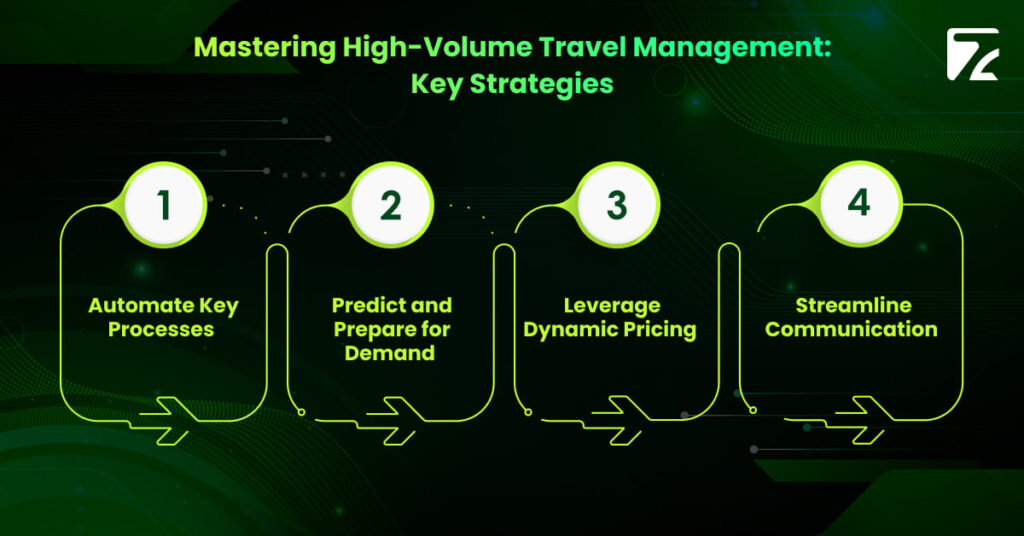Managing a travel business is a lot like juggling. You’ve got a ton of balls in the air, and one slip can send everything crashing down. When your business grows and you start handling larger numbers of bookings, things can get tricky. Managing high-volume travel services is something that almost every travel professional will face at some point. But the good news is, with the right strategies, you can manage it smoothly and keep your customers happy.
Whether you’re managing group bookings, corporate travel, or handling a few hundred personal bookings, this guide is all about how to scale your travel services and make it all run as effortlessly as possible.
In the early days, everything is simple. A couple of bookings here and there, everything is straightforward. But the moment you start dealing with hundreds, or thousands, of bookings, things start to get a lot more complicated. And that’s when it can get overwhelming.
For example, imagine you’re organizing travel for a large group let’s say 200 people. It’s not just about booking the flights. You’ve got to sort hotels, transportation, activities, special requests, and more. Every piece of the puzzle has to fit perfectly. If just one thing is off, it can throw the entire thing out of whack.
These days, people expect more than just confirmation emails. They want instant answers, real-time updates, and personalized service, even if they’re just one traveler in a sea of hundreds. When you’re managing a lot of customers at once, meeting their expectations can become tricky.
But here’s the catch: if you fail to meet those expectations, they’ll look elsewhere. Keeping your customers satisfied while dealing with high volumes is the real challenge, but don’t worry it’s totally doable.
From customer preferences to booking details, to flight and hotel info it all adds up fast. When you’re handling high-volume travel management, keeping track of all that information can be overwhelming. If the systems you use aren’t well-organized, mistakes are bound to happen like double bookings or missed reservations. It’s essential to have your data organized so that you don’t miss a thing.

So, now that we know the challenges, let’s talk about the solutions. How do you scale your operations and manage all that traffic without losing control?
There’s a reason why technology is the first thing on this list it’s the backbone of high-volume travel management. It’s what’s going to save you time, minimize mistakes, and keep everything in sync.
No more relying on spreadsheets or manual checks. Automated booking systems update availability and confirmations in real-time, so everything stays accurate. This helps you handle more bookings without the risk of overbooking or confirming something that isn’t actually available.
For example, let’s say you’re booking a hotel for a group of 300 people. An automated system will instantly confirm their rooms, track availability, and keep things up-to-date saving you a ton of time and reducing human error.
A CRM system helps you keep track of each customer’s preferences and booking history. It allows you to offer a personalized experience, even when you’re handling large volumes of customers. This is key when you want to maintain that “personal touch” while still scaling your operations.
Imagine a return customer who booked with you last year they might have specific preferences for room type or transportation. A CRM system helps you keep track of that information, ensuring you provide them with the same (or better!) service next time.
You already have all the data you need now let’s talk about how to use it effectively. Data analytics isn’t just for tracking performance; it helps you plan, forecast, and make better decisions.
By looking at past trends, you can predict when your business is going to be busiest. Knowing when the demand will spike allows you to plan ahead. You can make sure your team is ready, book more inventory in advance, and be fully prepared for a surge in bookings.
For example, if your data shows that bookings tend to increase during the summer months or around a particular holiday, you can get ahead by making sure you’ve secured enough hotel rooms or transportation. That way, when the rush hits, you’re ready to handle it smoothly.
Real-time syncing across your booking platforms ensures that your data is always up-to-date. If a room gets booked, or a flight is canceled, the system updates instantly, so everyone on your team has the latest information at all times. This keeps everything organized and prevents errors from slipping through the cracks.
Communication is everything when managing high-volume travel management. If you’re managing hundreds of customers and multiple service providers, everyone needs to be on the same page.
Customers have different preferences for how they want to reach you some might call, others prefer email or live chat. Multi-channel support allows you to manage all of these channels in one place, so you’re never missing a message or call. Plus, having this system in place makes responding quicker, which is exactly what customers want.
Here’s the thing: 72% of customers expect a reply within 10 minutes when they reach out to a company for help. Being able to respond quickly no matter how they contact you is crucial when dealing with high volumes of inquiries.
When managing high volumes, communication within your team is just as important. Tools like Slack or Microsoft Teams allow you to easily share updates, ask questions, and stay on top of tasks. This ensures that everyone is aligned, and problems get addressed before they become bigger issues.
Dynamic pricing is a game-changer when it comes to scaling your travel services. The idea is simple: adjust your prices based on demand. This way, you’re not locked into static prices, and you can optimize your rates for the highest revenue.
When certain services are in high demand, such as hotel rooms during a peak season, dynamic pricing allows you to adjust the rates to match the demand. This helps you make the most of your busy periods and increases revenue.
For example, if there’s a major event in town and people are flocking to the city, you can increase hotel room prices to reflect the surge in bookings.
Customers love flexibility, especially when it comes to payment. Offering options like deposits, installment plans, or “pay later” services can increase your conversion rates, especially for larger bookings.
Statistically, a significant number of consumers prefer flexible payment terms this simple change can help you attract more customers and close more sales.
Managing high-volume travel services doesn’t have to be a headache. With the right systems, data, and strategies in place, you can scale your travel business without sacrificing service quality. By automating tasks, using real-time data, staying flexible with pricing, and communicating effectively, you’ll be able to handle even the busiest periods with ease.
Embrace these strategies, and you’ll find that scaling your business and handling large travel volumes doesn’t just become easier it becomes an opportunity to improve your operations and serve your customers better.
So, take a deep breath, plan ahead, and get ready for success. You’ve got this!
It’s handling a large number of travel bookings and services efficiently while maintaining quality customer service.
Use automated booking systems and keep data synced in real-time to avoid errors.
Automation reduces manual work, keeps bookings up-to-date, and ensures accuracy across platforms.
Analyze past booking data to forecast high-demand times and prepare in advance.
Use a CRM system to track customer preferences and offer tailored experiences.

Travel Automation Expert